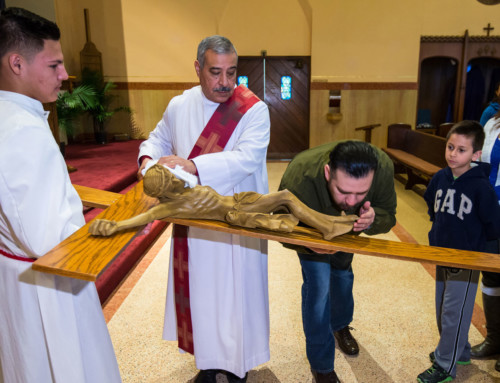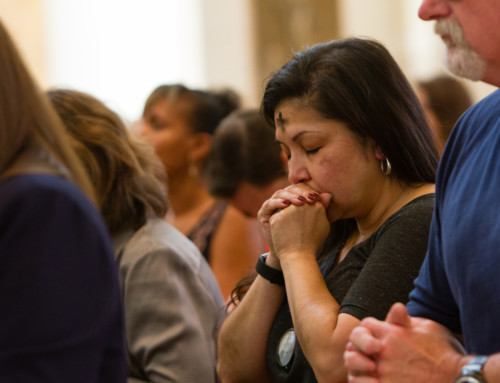Raise Up. Sacrifice. Offer.
One important way to grow in the Lord is to observe the penitential practices that strengthen us for resisting temptation, allow us to express our sorrow for the sins we have committed, and help to repair the tear caused by our sinning.
Penitential practices take many forms: apologizing to an injured party, healing divisions within our families, fasting during the Lenten season, or graciously accepting the menial tasks of life. The purpose of penance is not to diminish life but to enrich it.
Jesus, in Matthew’s Gospel, calls us to pray, to fast, and to give alms: “when you pray, do not be like the hypocrites,” “when you fast, do not look gloomy,” “when you give alms, do not let your left hand know what your right is doing” (Mt 6:5, 16, 3, respectively). As a Church, we ponder and pray over this call every Ash Wednesday. In a most profound way, the three spiritual exercises identified by Jesus are directed toward the nurturing of relationships.
Prayer, that process of listening to and responding to God’s daily call, sustains and nurtures our relationship with our triune God: Father, Son, and Holy Spirit. Without prayer, personal and communal, this relationship is diminished, sometimes to the point of complete silence on our part. Every day the Spirit of Jesus invites us to enter into that serious conversion that leads to blessed communion.
Fasting, a very special form of penance, and Jesus’ second call, has been a consistent part of our Catholic tradition. Fasting assists us in getting our own house in order. All of us have to deal with areas of servitude, whether in regard to smoking or alcohol consumption, misused sexuality, uncontrolled gambling, psychological hang-ups, spiritual obsessions, use of stimulants, immoderate use of the Internet, excessive amounts of television watching, or preoccupations with other forms of entertainment. By fasting and self-denial, by living lives of moderation, we have more energy to devote to God’s purposes and a better self-esteem that helps us to be more concerned with the well-being of others.
The third call of the Lord is to give alms. Jesus was always concerned about those who were poor and in need. He was impressed by the widow who, though having so little, shared her resources with others: “I tell you truly, this poor widow put in more than all the rest; for those others have all made offerings from their surplus wealth, but she, from her poverty, has offered her whole livelihood” (Lk 21:3-4). To be a disciple of Christ means to live a life of charity. To be a disciple of Jesus is to live a life f stewardship, generously giving of our time, talent, and treasure.
At the heart of all penance is the call to conversion. Jesus’ imperative “Repent, and believe in the gospel” (Mk 1:15) makes explicit this connection between authentic discipleship and penitential discipline. Discipleship, our following of Jesus, embraces discipline, a firm commitment to do whatever is demanded in furthering God’s kingdom. Viewed in this way, the virtue of penance is not optional, just as weeding a garden is not optional for a responsible caretaker. The gardener is concerned with a bountiful harvest; the disciple is concerned about greater conformity to the person of Jesus.
If we are serious about embracing the penitential discipline that is rooted in the call to discipleship, then we will identify specific times and places for prayer, penance, and works of charity. Growth in spiritual maturity demands a certain level of specificity, for it shows that we take seriously God’s call to discipline and are willing to hold ourselves accountable. In our Catholic tradition we specify certain days and seasons for special works of penance: Fridays, on which we commemorate the death of the Lord, and Lent, our forty days of preparation for the Easter mysteries.
This article is an excerpt from Penitential Practices for Today’s Catholics (USCCB, Washington, DC, 2001), 1-5.
Copyright © 2001, United States Conference of Catholic Bishops, Washington, DC. All rights reserved. Used with permission.







